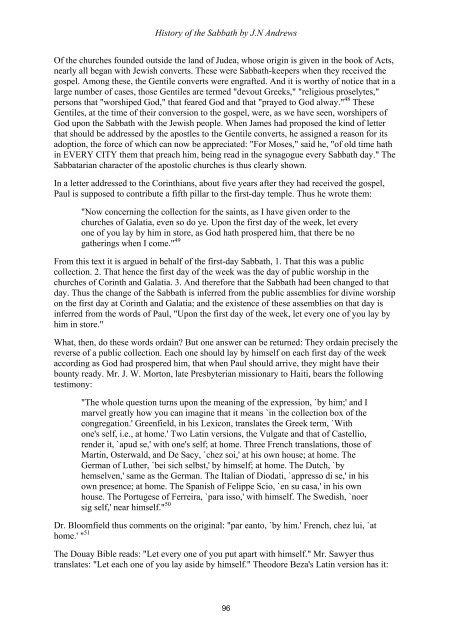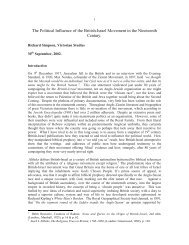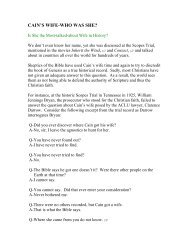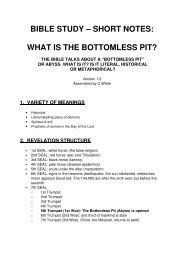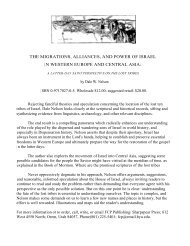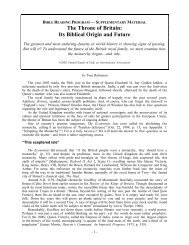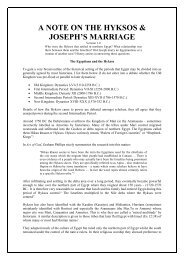HISTORY OF THE SABBATH - Friends of the Sabbath Australia
HISTORY OF THE SABBATH - Friends of the Sabbath Australia
HISTORY OF THE SABBATH - Friends of the Sabbath Australia
You also want an ePaper? Increase the reach of your titles
YUMPU automatically turns print PDFs into web optimized ePapers that Google loves.
History <strong>of</strong> <strong>the</strong> <strong>Sabbath</strong> by J.N AndrewsOf <strong>the</strong> churches founded outside <strong>the</strong> land <strong>of</strong> Judea, whose origin is given in <strong>the</strong> book <strong>of</strong> Acts,nearly all began with Jewish converts. These were <strong>Sabbath</strong>-keepers when <strong>the</strong>y received <strong>the</strong>gospel. Among <strong>the</strong>se, <strong>the</strong> Gentile converts were engrafted. And it is worthy <strong>of</strong> notice that in alarge number <strong>of</strong> cases, those Gentiles are termed "devout Greeks," "religious proselytes,"persons that "worshiped God," that feared God and that "prayed to God alway." 48 TheseGentiles, at <strong>the</strong> time <strong>of</strong> <strong>the</strong>ir conversion to <strong>the</strong> gospel, were, as we have seen, worshipers <strong>of</strong>God upon <strong>the</strong> <strong>Sabbath</strong> with <strong>the</strong> Jewish people. When James had proposed <strong>the</strong> kind <strong>of</strong> letterthat should be addressed by <strong>the</strong> apostles to <strong>the</strong> Gentile converts, he assigned a reason for itsadoption, <strong>the</strong> force <strong>of</strong> which can now be appreciated: "For Moses," said he, "<strong>of</strong> old time hathin EVERY CITY <strong>the</strong>m that preach him, being read in <strong>the</strong> synagogue every <strong>Sabbath</strong> day." TheSabbatarian character <strong>of</strong> <strong>the</strong> apostolic churches is thus clearly shown.In a letter addressed to <strong>the</strong> Corinthians, about five years after <strong>the</strong>y had received <strong>the</strong> gospel,Paul is supposed to contribute a fifth pillar to <strong>the</strong> first-day temple. Thus he wrote <strong>the</strong>m:"Now concerning <strong>the</strong> collection for <strong>the</strong> saints, as I have given order to <strong>the</strong>churches <strong>of</strong> Galatia, even so do ye. Upon <strong>the</strong> first day <strong>of</strong> <strong>the</strong> week, let everyone <strong>of</strong> you lay by him in store, as God hath prospered him, that <strong>the</strong>re be noga<strong>the</strong>rings when I come." 49From this text it is argued in behalf <strong>of</strong> <strong>the</strong> first-day <strong>Sabbath</strong>, 1. That this was a publiccollection. 2. That hence <strong>the</strong> first day <strong>of</strong> <strong>the</strong> week was <strong>the</strong> day <strong>of</strong> public worship in <strong>the</strong>churches <strong>of</strong> Corinth and Galatia. 3. And <strong>the</strong>refore that <strong>the</strong> <strong>Sabbath</strong> had been changed to thatday. Thus <strong>the</strong> change <strong>of</strong> <strong>the</strong> <strong>Sabbath</strong> is inferred from <strong>the</strong> public assemblies for divine worshipon <strong>the</strong> first day at Corinth and Galatia; and <strong>the</strong> existence <strong>of</strong> <strong>the</strong>se assemblies on that day isinferred from <strong>the</strong> words <strong>of</strong> Paul, "Upon <strong>the</strong> first day <strong>of</strong> <strong>the</strong> week, let every one <strong>of</strong> you lay byhim in store."What, <strong>the</strong>n, do <strong>the</strong>se words ordain? But one answer can be returned: They ordain precisely <strong>the</strong>reverse <strong>of</strong> a public collection. Each one should lay by himself on each first day <strong>of</strong> <strong>the</strong> weekaccording as God had prospered him, that when Paul should arrive, <strong>the</strong>y might have <strong>the</strong>irbounty ready. Mr. J. W. Morton, late Presbyterian missionary to Haiti, bears <strong>the</strong> followingtestimony:"The whole question turns upon <strong>the</strong> meaning <strong>of</strong> <strong>the</strong> expression, `by him;' and Imarvel greatly how you can imagine that it means `in <strong>the</strong> collection box <strong>of</strong> <strong>the</strong>congregation.' Greenfield, in his Lexicon, translates <strong>the</strong> Greek term, `Withone's self, i.e., at home.' Two Latin versions, <strong>the</strong> Vulgate and that <strong>of</strong> Castellio,render it, `apud se,' with one's self; at home. Three French translations, those <strong>of</strong>Martin, Osterwald, and De Sacy, `chez soi,' at his own house; at home. TheGerman <strong>of</strong> Lu<strong>the</strong>r, `bei sich selbst,' by himself; at home. The Dutch, `byhemselven,' same as <strong>the</strong> German. The Italian <strong>of</strong> Diodati, `appresso di se,' in hisown presence; at home. The Spanish <strong>of</strong> Felippe Scio, `en su casa,' in his ownhouse. The Portugese <strong>of</strong> Ferreira, `para isso,' with himself. The Swedish, `noersig self,' near himself." 50Dr. Bloomfield thus comments on <strong>the</strong> original: "par eanto, `by him.' French, chez lui, `athome.' " 51The Douay Bible reads: "Let every one <strong>of</strong> you put apart with himself." Mr. Sawyer thustranslates: "Let each one <strong>of</strong> you lay aside by himself." Theodore Beza's Latin version has it:96


